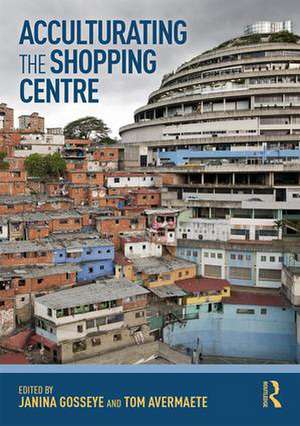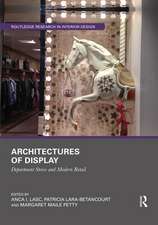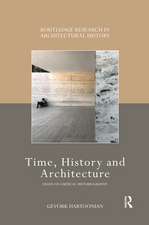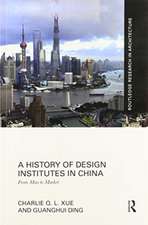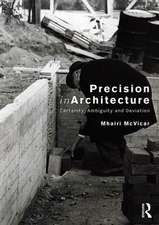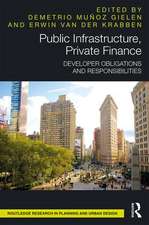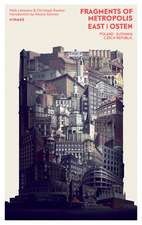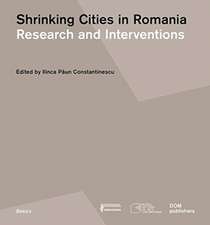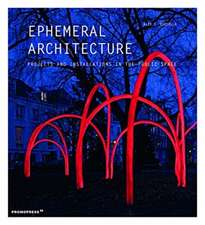Acculturating the Shopping Centre
Editat de Janina Gosseye, Tom Avermaeteen Limba Engleză Hardback – 25 oct 2018
Including more than 50 illustrations, this book considers the evolving architecture of shopping centres. It would be beneficial to academics and students across a number of areas such as architecture, urban design, cultural geography and sociology.
| Toate formatele și edițiile | Preț | Express |
|---|---|---|
| Paperback (1) | 258.09 lei 43-57 zile | |
| Taylor & Francis – 18 dec 2020 | 258.09 lei 43-57 zile | |
| Hardback (1) | 763.39 lei 43-57 zile | |
| Taylor & Francis – 25 oct 2018 | 763.39 lei 43-57 zile |
Preț: 763.39 lei
Preț vechi: 1026.94 lei
-26% Nou
Puncte Express: 1145
Preț estimativ în valută:
146.08€ • 152.90$ • 121.58£
146.08€ • 152.90$ • 121.58£
Carte tipărită la comandă
Livrare economică 31 martie-14 aprilie
Preluare comenzi: 021 569.72.76
Specificații
ISBN-13: 9781472485045
ISBN-10: 1472485041
Pagini: 192
Ilustrații: 18 Line drawings, black and white; 42 Halftones, black and white; 60 Illustrations, black and white
Dimensiuni: 156 x 234 x 11 mm
Greutate: 0.41 kg
Ediția:1
Editura: Taylor & Francis
Colecția Routledge
Locul publicării:Oxford, United Kingdom
ISBN-10: 1472485041
Pagini: 192
Ilustrații: 18 Line drawings, black and white; 42 Halftones, black and white; 60 Illustrations, black and white
Dimensiuni: 156 x 234 x 11 mm
Greutate: 0.41 kg
Ediția:1
Editura: Taylor & Francis
Colecția Routledge
Locul publicării:Oxford, United Kingdom
Cuprins
Introduction 1. Westfield’s Architecture, from the Antipodes to London 2. Eastern Promises 3. The Latin American Shopping Centre: Cultural Translation, Symbolic Adaptation, and Typological Evolution of Commercial Architecture in Latin American Cities 4. El Helicoide: Venezuela’s Futuristic Living Ruin 5. A Domesticated Shopping Mall in Modern Tehran: The (re)development of Ekbatan 6. Re-centring Tema: From Isotropic Commercial Centres to an Intense Infrastructure of Street-vending 7. The Boulevard Commercial Project in Manado, Indonesia: Trickled-down Globalization versus a Catalysed Super-local Coda The Travelling Type: How Buildings and Practices Migrate Across Cultures
Notă biografică
Janina Gosseye is Senior Research Associate at ETH Zürich, Switzerland. Her research is situated at the nexus of architectural theory, urban planning and social and political history. Gosseye has edited and authored several books, including Shopping Towns Europe 1945–75: Commercial Collectivity and the Architecture of the Shopping Centre (2017, with Tom Avermaete). Her research has also been published in several leading journals, including theJournal of Architecture and the Journal of Urban History. In 2018, Gosseye was awarded a Graham Foundation Grant for her forthcoming book Speaking of Buildings (2019, with Naomi Stead and Deborah van der Plaat).
Tom Avermaete is Professor at ETH Zürich, Switzerland, where he is Chair for the History and Theory of Urban Design. Avermaete has a special research interest in the post-war public realm and the architecture of the city in Western and non-Western contexts. He is the author of Another Modern: The Post-War Architecture and Urbanism of Candilis-Josic-Woods (2005) and Casablanca, Chandigarh: A Report on Modernization (2014, with Maristella Casciato). Avermaete has also edited numerous books, including Shopping Towns Europe 1945–75: Commercial Collectivity and the Architecture of the Shopping Centre (2017, with Janina Gosseye), and is a member of the editorial team of OASE Architectural Journal and the advisory board of the Architectural Theory Review, among others.
Tom Avermaete is Professor at ETH Zürich, Switzerland, where he is Chair for the History and Theory of Urban Design. Avermaete has a special research interest in the post-war public realm and the architecture of the city in Western and non-Western contexts. He is the author of Another Modern: The Post-War Architecture and Urbanism of Candilis-Josic-Woods (2005) and Casablanca, Chandigarh: A Report on Modernization (2014, with Maristella Casciato). Avermaete has also edited numerous books, including Shopping Towns Europe 1945–75: Commercial Collectivity and the Architecture of the Shopping Centre (2017, with Janina Gosseye), and is a member of the editorial team of OASE Architectural Journal and the advisory board of the Architectural Theory Review, among others.
Recenzii
"Global historiography at its best! With case studies from diverse sites such as Venenuela, Iran, Indonesia and the UK, this collection of essays by an international cast of scholars offers a long needed discussion of the complex global forms and affects of the much maligned (sub)urban shopping mall."
Vikramaditya Prakash, University of Washington, USA
"This collection of brilliant scholarly essays sheds light on what is arguably the only building type whose signature has transformed the urban and sociological landscapes of contemporary megalopolises the world over. The metamorphosis of the functional and geometrical principles characterizing the city core has been accelerated by the transformation of main streets into shopping centre, while central, pedestrian street-like spaces have mutated in scale into the creation of urban mall. Janina Gosseye and Tom Avermaete have edited a book that demonstrates that this ‘(mall)eable’ modernist type is far from being a ‘non-lieu’ -- rather, it is the ritual space of a new citizenship." Maristella Casciato, Senior Curator Architecture, Getty Research Institute, Los Angeles, USA
"Acculturating the Shopping Centre shows how these often-stereotyped places, built across the global south since the 1950s, were dynamic hybrids, variously shaped by shoppers, politicians, developers, builders and citizens. The authors reach beyond the zero sum critiques of consumption to show the diversity of shopping centres – as physical sites and as cultural situations. The essays also consider how, under the guise of shopping, the socio-historical concept of "the urban" transforms, re-making cultural norms, creating new sites of communal experience, and requiring new forms of global inquiry. The mall is dead, long live the mall!"
David Smiley, University of Columbia, USA
Vikramaditya Prakash, University of Washington, USA
"This collection of brilliant scholarly essays sheds light on what is arguably the only building type whose signature has transformed the urban and sociological landscapes of contemporary megalopolises the world over. The metamorphosis of the functional and geometrical principles characterizing the city core has been accelerated by the transformation of main streets into shopping centre, while central, pedestrian street-like spaces have mutated in scale into the creation of urban mall. Janina Gosseye and Tom Avermaete have edited a book that demonstrates that this ‘(mall)eable’ modernist type is far from being a ‘non-lieu’ -- rather, it is the ritual space of a new citizenship." Maristella Casciato, Senior Curator Architecture, Getty Research Institute, Los Angeles, USA
"Acculturating the Shopping Centre shows how these often-stereotyped places, built across the global south since the 1950s, were dynamic hybrids, variously shaped by shoppers, politicians, developers, builders and citizens. The authors reach beyond the zero sum critiques of consumption to show the diversity of shopping centres – as physical sites and as cultural situations. The essays also consider how, under the guise of shopping, the socio-historical concept of "the urban" transforms, re-making cultural norms, creating new sites of communal experience, and requiring new forms of global inquiry. The mall is dead, long live the mall!"
David Smiley, University of Columbia, USA
Descriere
This book examines whether the shopping centre should be qualified as a global architectural type that moves across national and cultural borders in the slipstream of globalization, or should instead be understood as an expression of negotiations between mall developers and local actors such as architects/ governments/ citizens on the other.
